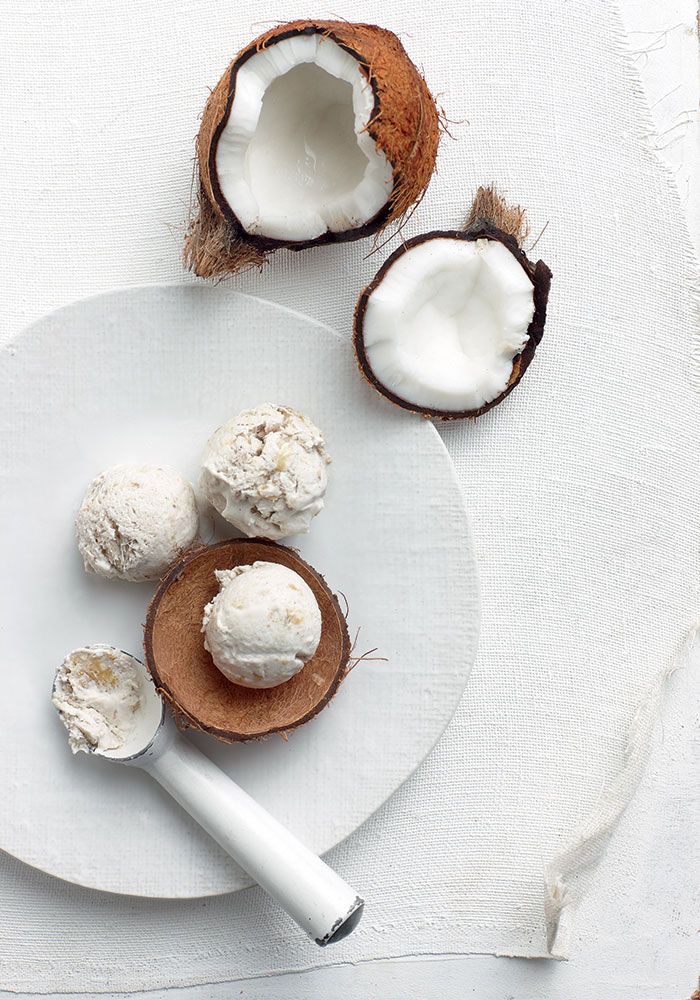
Coconut oil is one of the few foods that can be classified as a “superfood.”
Its unique combination of fatty acids can have positive effects on your health.
This includes fat loss, better brain function and various other impressive benefits.
Here are the top 10 evidence-based health benefits of coconut oil.
1. Coconut Oil Contains Fatty Acids With Potent Medicinal Properties
Coconut oil is high in healthy saturated fats that have different effects than most other fats in your diet.
These fats can boost fat burning and provide your body and brain with quick energy. They also raise the good HDL cholesterol in your blood, which is linked to reduced heart disease risk.
Most fats in the diet are called long-chain triglycerides, but the fats in coconut oil are known as medium chain triglycerides (MCTs). What this means is that the fatty acids are shorter than most other fats (1).
When you eat these types of fats, they go straight to the liver, where they are used as a quick source of energy or turned into ketones.
Ketones can have powerful benefits for the brain, and are being studied as treatment for epilepsy, Alzheimer’s and other conditions.
SUMMARY:
Coconut oil is high in fats called medium chain triglycerides, which are metabolized differently than most other fats. These special fats are responsible for a lot of the health benefits of coconut oil.
2. Populations That Eat a Lot of Coconut Oil Are Healthy
Coconut is an exotic food in the Western world, primarily consumed by health conscious people.
However, in some parts of the world, coconut (loaded with coconut oil) is a dietary staple that people have thrived on for many generations.
The best example of such a population is the Tokelauans, which live in the South Pacific.
They used to eat over 60% of their calories from coconuts. When studied, they were found to be in excellent health, with very low rates of heart disease (2).
Another example of a population that ate a lot of coconut and remained in excellent health is the Kitavans (3).
SUMMARY:
Several populations around the world have thrived for multiple generations eating massive amounts of coconut.
3. Coconut Oil Can Increase Fat Burning
Obesity is one of the biggest health problems in the world.
While some people think obesity is only a matter of calories, others (myself included) believe that the sources of those calories are important too.
It is a fact that different foods affect our bodies and hormones in different ways. In this regard, a calorie is not a calorie.
The medium-chain triglycerides (MCTs) in coconut oil can increase how many calories you burn compared to the same amount of calories from longer chain fats (4).
One study found that 15-30 grams of MCTs per day increased 24 hour energy expenditure by 5%, totalling about 120 calories per day (5).
SUMMARY:
The medium chain triglycerides in coconut oil have been shown to increase calories burned over 24 hours by as much as 5%.
4. Coconut Oil Can Kill Harmful Microorganisms
The 12-carbon lauric acid makes up about 50% of the fatty acids in coconut oil.
When lauric acid is digested, it also forms a substance called monolaurin.
Both lauric acid and monolaurin can kill harmful pathogens like bacteria, viruses and fungi (6).
For example, these substances have been shown to help kill the bacteria Staphylococcus aureus (a very dangerous pathogen) and the yeast Candida albicans, a common source of yeast infections in humans (7, 8).
Summary
The fatty acids in coconut oil can kill harmful pathogens, including bacteria, viruses and fungi. This could potentially help to prevent infections.
5. Coconut Oil Can Reduce Your Hunger, Helping You Eat Less
One interesting feature of the fatty acids in coconut oil is that they can reduce your hunger.
This may be related to the way the fats are metabolized, because ketones can have an appetite reducing effect (9).
In one study, varying amounts of medium and long chain triglycerides were fed to 6 healthy men.
The men eating the most MCTs ate 256 fewer calories per day, on average (10).
Another study in 14 healthy men discovered that those who ate the most MCTs at breakfast ate fewer calories at lunch (11).
These studies were small and only done for short periods of time. If this effect were to persist over the long term, it could help lead to reduced body weight over a period of several years.
SUMMARY:
The fatty acids in coconut oil can significantly reduce appetite, which may lead to reduced body weight over the long term.
6. The Fatty Acids in Coconuts May Reduce Seizures
A so-called ketogenic (very low carb, very high fat) diet is currently being studied to treat various disorders.
The best known therapeutic application of this diet is treating drug-resistant epilepsy in children (12).
This diet involves eating very few carbohydrates and large amounts of fat, leading to greatly increased concentrations of ketones in the blood.
For some reason, the diet dramatically reduces the rate of seizures in epileptic children, even those who haven’t had success with multiple different types of drugs.
Because the fatty acids in coconut oil get shipped to the liver and turned into ketones, they are often used in epileptic patients to induce ketosis while allowing for a bit more carbs in the diet (13, 14).
SUMMARY:
The MCTs in coconut oil can increase blood concentration of ketone bodies, which can help reduce seizures in epileptic children.
7. Coconut Oil Can Raise The Good HDL Cholesterol
Coconut oil contains natural saturated fatsthat increase the good HDL cholesterol in your body. They may also help turn the bad LDL cholesterol into a less harmful form.
By increasing HDL, many experts believe that coconut oil could be good for heart health compared to many other fats.
In one study in 40 women, coconut oil reduced total and LDL cholesterol while increasing HDL compared to soybean oil (15).
Another study in 116 patients showed that a dietary program that included coconut oil raised levels of the good HDL cholesterol (16).
SUMMARY:
A few studies have shown that coconut oil can raise blood levels of HDL cholesterol, which is linked to improved metabolic health and a lower risk of heart disease.
8. Coconut Oil Can Protect Your Skin, Hair and Dental Health
Coconut oil has many uses that have nothing to do with eating it.
Many people are using it for cosmetic purposes and to improve the health and appearance of their skin and hair.
Studies on individuals with dry skin show that coconut oil can improve the moisture content of the skin. It can also reduce symptoms of eczema (17, 18).
Coconut oil can also be protective against hair damage and one study shows effectiveness as a weak sunscreen, blocking about 20% of the sun’s ultraviolet rays (19, 20)
Another application is using it like mouthwash in a process called oil pulling, which can kill some of the harmful bacteria in the mouth, improve dental health and reduce bad breath (21, 22, 23).
SUMMARY:
Coconut oil can also be applied topically, with studies showing it to be effective as a skin moisturizer and protecting against hair damage.
9. The Fatty Acids in Coconut Oil Can Boost Brain Function in Alzheimer’s Patients
Alzheimer’s disease is the most common cause of dementia worldwide and occurs primarily in elderly individuals.
In Alzheimer’s patients, there appears to be a reduced ability to use glucose for energy in certain parts of the brain.
Researchers have speculated that ketones can provide an alternative energy source for these malfunctioning brain cells and reduce symptoms of Alzheimer’s (24).
In one 2006 study, consumption of medium chain triglycerides led to improvement in brain function in patients with milder forms of Alzheimer’s (25).
However, keep in mind that research is still early and there is no evidence to suggest that coconut oil itself helps with Alzheimer’s disease.
SUMMARY:
Preliminary studies suggest that medium-chain triglycerides can increase blood levels of ketones, supplying energy for the brain cells of Alzheimer’s patients and relieving symptoms.
10. Coconut Oil Can Help You Lose Fat, Especially The Harmful Abdominal Fat
Given that coconut oil can reduce appetite and increase fat burning, it makes sense that it can also help you lose weight.
Coconut oil appears to be especially effective at reducing belly fat, which lodges in the abdominal cavity and around organs (4).
This is the most dangerous fat of all and is highly associated with many chronic Western diseases.
Waist circumference is easily measured and is a great marker for the amount of fat in the abdominal cavity.
In a study of 40 women with abdominal obesity, supplementing with 30 mL (2 tablespoons) of coconut oil per day led to a significant reduction in both BMI and waist circumference over a period of 12 weeks (15).
Another study in 20 obese males noted a reduction in waist circumference of 1.1 inches (2.86 cm) after 4 weeks of 30 mL (2 tablespoons) of coconut oil per day (26).
Coconut oil is still high in calories so you shouldn’t add a ton of it to your diet. But replacing some of your other cooking fats with coconut oil could have a small weight loss benefit.
11. Anything Else?
If you want to buy coconut oil, then there is an excellent selection on Amazon with thousands of customer reviews that are fun to browse through.
It is also available in most health food stores.
In order to get the impressive health benefits outlined in the article, then make sure to choose organic, virgin coconut oil — not the refined stuff.
This is really just the tip of the iceberg. People are using coconut oil for all sorts of things with great results.
So what dosage should you take?
In some cases, the amount of oil given was a percentage of total calories, which varied from person to person.
In three similar studies, a combination of coconut oil and butter were the main fat sources in a 40% fat diet. Normal-weight women experienced significant temporary increases in metabolic rate and calorie expenditure (1, 2, 3).
In a study comparing the effects of different fats on cholesterol levels, a diet with 20% of total calories from coconut oil raised HDL cholesterol in women but not in men. In addition, it was shown to raise LDL cholesterol less than butter (4).
In each of these studies, a person consuming 2,000 calories for weight maintenance would have included 36–39 grams of coconut oil per day as part of a mixed diet.
Fixed Dosages
In other studies, each participant consumed the same amount of oil regardless of calorie intake.
In one study, overweight or obese people taking 2 tablespoons (30 ml) of coconut oil per day for 4 weeks lost an average of 1.1 inches (2.87 cm) from their waists (5).
What’s more, the participants lost this weight without deliberately restricting calories or increasing physical activity (5).
In another study, obese women took 2 tablespoons (30 ml) of coconut or soybean oil while on a calorie-restricted diet. Their waist sizes decreased and HDL cholesterol increased, while the control group had the opposite response (6).
Bottom Line
In studies, coconut oil has benefits when given at fixed dosages or as a percentage of total calorie intake.
How Much Coconut Oil Per Day?
Studies have found that 2 tablespoons (30 ml) seems to be an effective dose.
This has been shown to benefit weight, reduce belly fat and improve other health markers (5, 6).
Some studies used up to 2.5 tablespoons (39 grams) per day, depending on calorie intake (1, 2, 3, 4).
Two tablespoons provide about 18 grams of medium-chain triglycerides, which is within the range of 15–30 grams that has been shown to increase metabolic rate (7).
Eating 2 tablespoons (30 ml) per day is a reasonable amount that leaves room for other healthy fats in your diet, such as nuts, extra virgin olive oil and avocados.
However, start slowly to avoid the nausea and loose stools that may occur with high intake. Take 1 teaspoon per day, gradually increasing to 2 tablespoons per day over 1–2 weeks.
Bottom Line
Consuming 2 tablespoons per day is sufficient to achieve health benefits, but it’s best to work up to this amount gradually.
How to Eat Coconut Oil
There are several ways to include this oil in your diet.
Use it for Cooking
Coconut oil is ideal for cooking because almost 90% of its fatty acids are saturated, making it extremely stable at high temperatures.
It also has a high smoke point of 350°F (175°C).
Coconut oil is semi-solid at room temperature and melts at 76°F (24°C). So store it in a cupboard, rather than the refrigerator, to keep it pliable.
During the colder months, it may become very solid and difficult to scoop out of the container. This can be remedied by whipping it with an electric mixer or in a blender.
Here are several cooking ideas:
* Sautéing or stir-frying: Use 1–2 tablespoons of this oil to cook vegetables, eggs, meat or fish.
* Popcorn: Drizzle melted coconut oil on air-popped popcorn or try it in stove-top popcorn.
* Baking: Use it to coat poultry or meat before rubbing with seasonings.
Add to Coffee or Tea
Another way to take this oil is in coffee or tea. Aim for a small amount — about a teaspoon or two. Below is a quick tea recipe featuring coconut oil.
Cocoa Chai Tea for One
* Chai tea bag (herbal or regular).
* 1 tablespoon unsweetened cocoa powder.
* 1 tablespoon cream or half and half.
* 1 teaspoon coconut oil.
* Stevia or other sweetener, to taste.
To make this, pour boiling water over the tea bag and let it steep for 2–3 minutes. Remove the tea bag, add the remaining ingredients and stir until well mixed.
BOTTOM LINE:
Coconut oil can be used for cooking, in recipes and to add delicious richness to hot beverages.
What About Supplements?
Coconut oil is also available in capsule form.
In some ways it may seem more convenient, particularly for traveling. However, there’s a distinct downside to this method of delivery.
Most capsules contain 1 gram per capsule. In order to get 2 tablespoons (30 ml) per day, you would need to take about 30 capsules on a daily basis.
For most people, this just isn’t realistic. Instead, try using coconut oil for cooking or include it in recipes.
BOTTOM LINE:
Coconut oil capsules need to be consumed in very large quantities in order to achieve an effective dosage.
Calories Still Count
Coconut oil provides valuable benefits, but there are limits to how much you should eat.
In fact, each tablespoon contains 130 calories.
And although medium-chain triglycerides may boost metabolic rate slightly, eating more calories than needed could still lead to weight gain.
Research has shown that coconut oil is most effective when it replaces less healthy fats in the diet, rather than being added on top of the fat you’re currently consuming.
Taking about 2 tablespoons daily seems to be the best strategy for optimizing health.
BOTTOM LINE:
For best results, replace less healthy fats with coconut oil rather than increasing your current fat intake.
By Health Line







